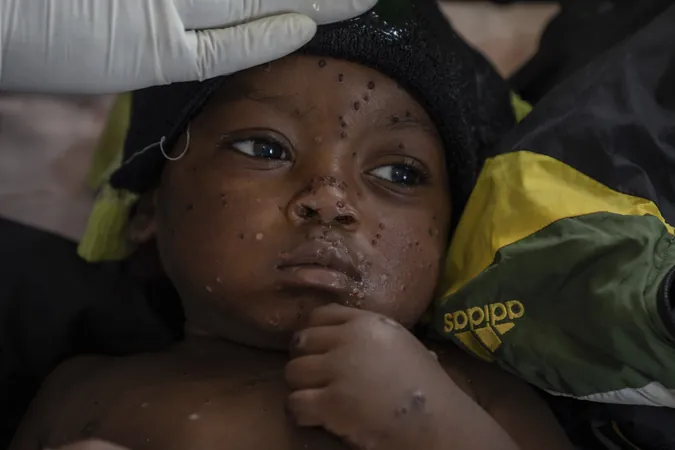
Mpox Crisis in Congo: Are We Finally Seeing a Stabilization? Experts Call for Urgent Vaccination Efforts!
2024-11-03
Author: Charlotte
Mpox Cases Show Signs of Stabilization
As mpox cases in the Democratic Republic of Congo show signs of stabilization, health experts warn that urgent vaccination efforts are needed to truly stamp out the virus. The World Health Organization (WHO) declared a global emergency for mpox in August after cases surged, but recent data suggests that this epidemic may be on the decline.
Current Statistics and Challenges
In the past few weeks, the Congo has been documenting around 200 to 300 laboratory-confirmed mpox cases each week, a notable decrease from nearly 400 cases per week reported in July. This positive trend is also evident in Kamituga, a mining city in eastern Congo, where the more infectious variant of mpox first originated.
However, it’s far from a complete victory. The WHO acknowledges that only about 40% to 50% of suspected mpox cases in Congo have been tested. The virus continues to circulate in various regions, including Uganda, raising concerns over potential underreporting and mismanagement of the crisis.
Vaccination Efforts and Vaccine Supply
Despite the decline in case numbers, the lack of vaccines remains a significant hurdle. Congo has received only 265,000 doses, and it is estimated that only around 50,000 people in the nation of 110 million have been vaccinated. The challenges of reaching remote areas for vaccination are compounded by logistical issues, and experts are sounding the alarm over the potential for more genetic mutations of the virus if further vaccination is not prioritized.
Dr. Zakary Rhissa, who oversees operations for the charity Alima in Congo, emphasized the critical need for immediate vaccination efforts, stating, “If we miss this opportunity, the likelihood of another significant outbreak increases substantially.” This sentiment is backed up by alarming statistics: in 2023 alone, there have been approximately 43,000 suspected cases of mpox across Africa, with over 1,000 deaths, mostly concentrated in Congo.
Historical Context of Mpox Outbreaks
The history of mpox outbreaks serves as a cautionary tale. An outbreak in Nigeria in 2017 underpinned a global surge of cases in 2022 that affected more than 100 countries. The spread in Kamituga, initially driven by physical contact among miners and sex workers, presents an opportunity for targeted interventions including vaccination, surveillance, and education.
Take, for instance, Georgette Hamuli, an 18-year-old sex worker who recently received information about mpox when vaccination teams visited her neighborhood in Goma. “They told us we’re highly exposed to the risk of infection. We insist on condoms with our clients, but some refuse,









 Brasil (PT)
Brasil (PT)
 Canada (EN)
Canada (EN)
 Chile (ES)
Chile (ES)
 España (ES)
España (ES)
 France (FR)
France (FR)
 Hong Kong (EN)
Hong Kong (EN)
 Italia (IT)
Italia (IT)
 日本 (JA)
日本 (JA)
 Magyarország (HU)
Magyarország (HU)
 Norge (NO)
Norge (NO)
 Polska (PL)
Polska (PL)
 Schweiz (DE)
Schweiz (DE)
 Singapore (EN)
Singapore (EN)
 Sverige (SV)
Sverige (SV)
 Suomi (FI)
Suomi (FI)
 Türkiye (TR)
Türkiye (TR)